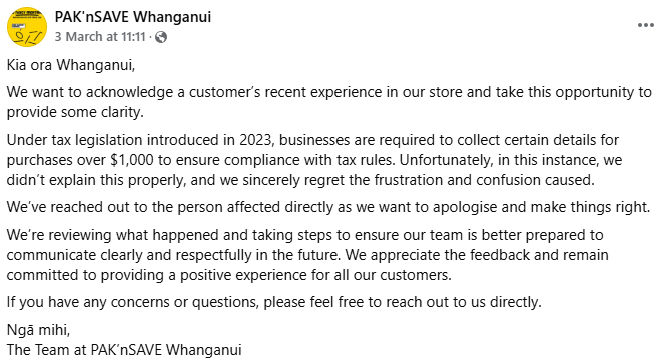Earlier this week, Pak’nSave made headlines, after a shopper was asked for personal details following a $1,000 grocery purchase.
Pak’nSave Whanganui also issued an official statement on their Facebook page, clarifying the situation and acknowledging the frustration caused.

Understanding the New IRD Rule
As per the NZ Herald article, Inland Revenue (IRD) spokeswoman confirmed that Pak’nSave was following the law in requesting customer details, and that under legislation passed in 2023, businesses registered for GST are required to keep a record of a customer’s details if they spend more than $1,000 in one transaction.
Let’s break down what this rule means and how it affects you.
What is the Record Keeping Rule for Businesses?
For supplies of more than $1,000, the taxable supply information must show information to identify the buyer of the goods or services. The taxable supply information does not need to include details relating to the quantity or volume of the supply; however, this information should be captured elsewhere in the business records.
Who would this apply to in practice?
- This would apply to any customers making transactions over $1,000, regardless of whether they are GST-registered.
- It’s based on the transaction amount, not the customer’s tax status.
Do You Have to Provide Your Details?
This is where things get tricky:
- Customers are NOT legally required to provide their details.
- However, businesses can be required to ask for them under the law, or may have policies in place to that require them to ask for this information.
- If a customer refuses to provide their information, a business can choose to decline the sale to comply with tax laws, or to comply with their internal business policy.
So while there’s no legal obligation for shoppers to provide details, in practice, you may not be able to complete your purchase without them.
What Should You Do?
If you’re asked for your details when making a large purchase:
- Ask the staff why they need your information – whether it is a legal requirement, or simply a business policy.
- Request to see the store’s policy or refer to IRD guidelines if unsure.
If you encounter staff who can’t explain the rule properly, it’s likely a training issue.
At first glance, this may seem intrusive or unnecessary, but it’s part of a broader effort by Inland Revenue and businesses to improve tax transparency in New Zealand. However, Pak’nSave’s handling of this situation exposed two key issues: a lack of public awareness about the rule and insufficient staff training. This combination led to confusion at checkout and ultimately escalated the situation.
P.S. Food for thought: If you happen to keep each transaction under $1,000, you might avoid this whole situation…
But hey, I’m just here to share general information—and let’s be real, this is an obvious way around for a shopper. That said, this is NOT tax advice!
It is important to note that structuring transactions to avoid tax obligations can sometimes be scrutinized under tax avoidance rules.
And honestly, is it really worth the effort—or the look from the person behind you in line tapping their foot impatiently?
Have you been asked for your details when making a large purchase?
Share your experience in the comments!
For more details, refer to the Tax Administration Act 1994 and IRD’s official guidelines.
– Baqir Hussain, FCCA
Director, Finex Chartered Certified Accountants
Check Out More Free Resources
- Sign up for my weekly ‘Tax Made Simple’ newsletter HERE.
- Watch my YouTube Channel for Free Tax Tips HERE.
- Get my book ‘10 Big Property Tax Mistakes That Cost Thousands, And How to Avoid Them‘ HERE. (Video series on YouTube).
Take the Next Step
- Want to work with me? It takes 3-minutes.
- Need urgent specific advice? Book a Strategic Consultation.
- Want to learn the basics of New Zealand small business tax?
Join my waitlist HERE – Small Business Tax Course for Business Owners launching soon. Email subscribers will be the first to know.

